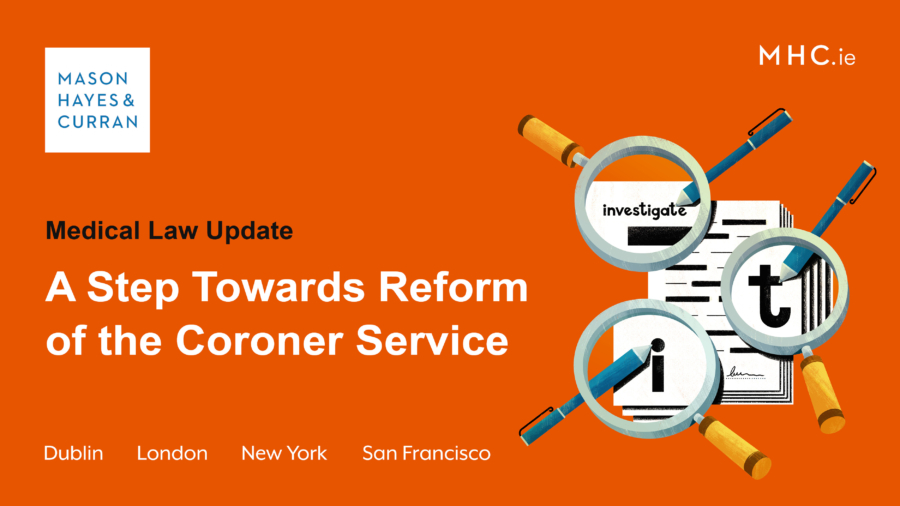A Step Towards Reform of the Coroner Service

The Irish Government recently published the Coroners (Amendment Bill) 2024. It is anticipated that the legislation will help to ease pressures currently experienced by the Coroner Service. Our Medical Law team examine the scope of the new measures introduced by the Bill and how they will materially assist in easing the backlog of cases and reduce waiting times for families.
The core function of a Coroner is to investigate sudden, unexplained and violent deaths. The Coroners (Amendment) Bill aims to ease pressure on the Coroner Service while plans for more fundamental reforms are developed. In particular, the Bill aims to reduce the backlog of cases before the Coroner’s District Court of Dublin. We examine some of the key proposed changes.
Increasing the number of coroners in the Dublin district
With a view to increasing the number of coroners in Dublin, the Bill provides for fixed-term appointments. Future appointments will be made on the basis that the role of a coroner is a full-time position. In addition, coroners for the Dublin District will no longer be able to appoint deputy coroners and any existing deputy will cease to hold office. An appointment to the Dublin district will be for a term of no more than five years with a maximum appointment of two terms.
Appointing temporary coroners nationwide
The Bill provides for the appointment of temporary coroners for a period of 12 months to any district where the workloads of the district warrant an appointment. The Minister for Justice may renew these appointments for a further period of 12 months if and when required. There can be a maximum of three of these renewals. This section of the Bill provides greater flexibility to respond to increased fatalities as might arise from a catastrophic type event in a particular district.
Other provisions
- Powers of the Minister for Justice to remove a coroner from office due to misconduct, ill-health, bringing the office into disrepute or failure to perform the functions of the office
- Providing that persons who have been convicted of a criminal office are ineligible for appointment
Comment
This Bill introduces some welcome reforms to the Coroner Service, particularly in the Dublin district. The proposed increase in Dublin coroners should help to ease the backlog of cases and reduce waiting times for families. This Bill is part of the government’s broader plan for fundamental reform. A public consultation process seeking input as to the future of the Coroner Service recently closed. We look forward to the Government’s further reform proposals once that input has been considered.
For more information, please contact a member of our Medical Law team.
People also ask
What verdicts can a Coroner issue? |
The range of verdicts that can be declared by the coroner or jury depends on the evidence heard during the inquest and can include: accidental death, misadventure, medical misadventure, suicide, natural causes, unlawful killing, narrative verdict, open verdict. |
What does the coroner do? |
The core function of a coroner is to investigate sudden, unexplained and violent deaths. A coroner establishes the “who, when, where and how” of an unexplained death. A coroner does not consider civil or criminal liability but rather simply establishes the factual circumstances of the death and records a verdict. |
How do I access depositions and other documents from the coroner’s court in Ireland? |
If you are an interested party you can seek copies of depositions and the post-mortem report relating to an inquest from the local coroner's office. You will need to write to the coroner's office requesting this information and include the name of the deceased, the date of death, the hospital involved (if any), what your interest is and the date of the inquest (if you know this). |
The content of this article is provided for information purposes only and does not constitute legal or other advice.
Share this:




